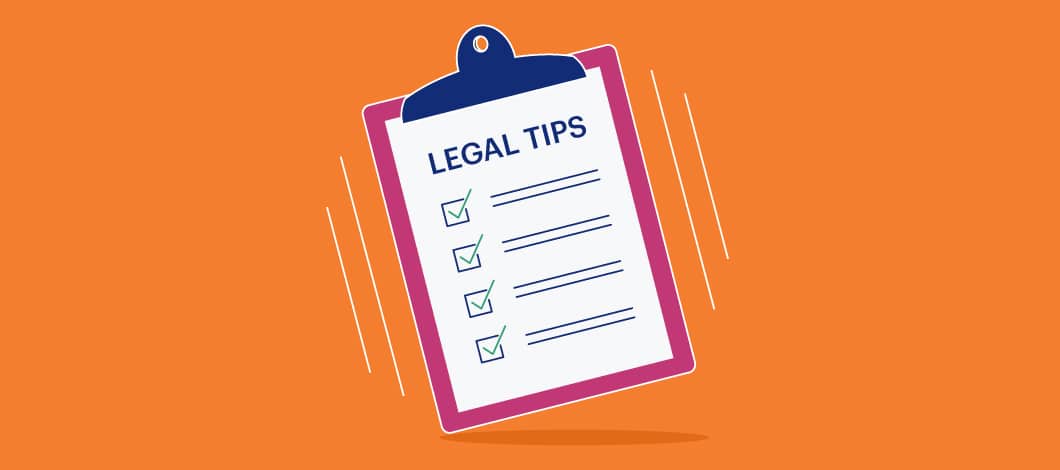Home-based business legal regulations can restrict what kind of company you’re able to operate. They can affect your taxes, too.
We’ll cover 10 of the most important legal tips on starting a small business from home:
- Check zoning regulations
- Review deed, lease and homeowner association (HOA) restrictions
- Register your business with your state
- Obtain any necessary licenses and permits
- Apply for a taxpayer identification number (TIN) or employer identification number (EIN)
- Secure permits for commercial signs
- Meet insurance obligations
- Check for home office safety issues
- Research your tax obligations
- Plan your tax deductions
Read on to learn what you need to know about how to run a business from home legally.
Why You Need to Know How to Legally Run a Home Business
Knowing how to make a home business legal is crucial for several reasons. First of all, you may not be able to do business at all if you don’t meet zoning requirements or abide by limitations set forth in your property’s deed (known as deed restrictions). You could end up investing significant money in your startup only to get shut down before you start making any money. This defeats the purpose of starting a business to turn a profit. You can easily avoid this expensive mistake by doing your homework.
Failing to comply with legal regulations can also result in fines and in some cases imprisonment. Both zoning authorities and HOAs can levy stiff fines. Some zoning laws may allow for imprisonment.
Leasing
If you’re leasing a property, violating the terms of your lease may create friction with your landlord. Your landlord may be concerned about you violating zoning regulations, or they may see your business as infringing on the rights of other tenants or neighbors. You may risk being forced out of your home.
Taxes
Legal considerations also affect your taxes as a home business owner. Running a home business gives you additional tax liabilities. These can vary depending on factors such as the legal structure of your business, what you sell and whether you hire employees. You also may be eligible for tax deductions, but you have to know what you’re allowed to claim and what you aren’t or you risk extra paperwork and penalties.
These types of considerations make it in your best interests to know your legal obligations when setting up a home-based business. You can save yourself hassle, time and expense by investing in some research and following best practices.
Legal Tips for Running a Small Business From Home
Fortunately, it usually isn’t too difficult to comply with legal regulations for running a home business. Here are some of the most important legal tips to start a small business from home. For most small business owners, you can pursue these steps on your own by following some routine procedures. If you do need help, you can seek assistance from a business attorney or, where applicable, a tax consultant.
1. Check Zoning Regulations
From a legal perspective, one of the most basic small home business tips you should follow is to check the zoning regulations which apply where you live.
Zoning ordinances are local laws passed by municipal authorities such as city councils or by county boards of commissioners. They are used by urban planners to divide land into zones which are coded to identify how land may be used and which restrictions apply. They prescribe the size of structures which may be placed on a piece of land, where they may be located and how they may be used.
Typically, zones are designated as:
- Residential
- Commercial
- Mixed-use.
Homes in mixed-use zones generally face fewer restrictions. Within residential zones, different restrictions may apply to certain types of dwellings, such as apartments.
There are several ways you can research your local zoning regulations. You can often find zoning ordinances online. You can call or visit your municipal or county clerk’s office or city attorney’s office. You can find information at your local library. You can consult a real estate attorney. Finally, if you’re buying a property, you can ask the real estate agent.
You will need to comply with both municipal and county ordinances, so be sure to research both. Some ordinances are vaguely worded and difficult to interpret. In this case, you can ask for clarification from a public official such as a municipal or county clerk, or you can ask a real estate attorney.
In some cases, even if local zoning ordinances prohibit a certain land use, you can request that local officials grant an exemption, known as a zoning variance. To obtain a variance, you will need to submit an application with a fee. The zoning board will review your request, including checking with your neighbors to see if there are any objections to your intended land use. In some cases, a hearing or approval from the local government may be required.
2. Review Lease, Deed and HOA Restrictions
In addition to zoning ordinances, you may be subject to restrictions on business use of your residence based on your lease, deed or HOA covenants, conditions and restrictions (CC&Rs). If you’re renting, your landlord may include restrictions on business use in your lease due to concerns over zoning laws, wear and tear on the property, noise disturbances or other issues.
You should first check your lease for any restrictions. If there are restrictions, you may still be able to obtain permission from your landlord. For example, a landlord isn’t as likely to object to an online home-based business as they are to a business where you would have to add an extension to a garage to receive customers. Your landlord may also require you to provide evidence that you’re in compliance with zoning regulations and insurance requirements.
If you own a home, some property deeds come with deed restrictions which prohibit all or some types of business use. You can find out if a property has a deed restriction by asking the seller or obtaining a document called a deed abstract from the county clerk’s office.
Lifting a deed restriction can be difficult, but there are ways it can be done. Some deed restrictions have expiration dates. Others stem from HOA bylaws or community bylaws, and these bylaws may include conditions for lifting restrictions. Some restrictions are placed by property developers and can be addressed by contacting the developer.
In addition to deed restrictions, HOAs may have their own restrictions in their CC&Rs. You can sometimes negotiate these. Failing to abide by HOA restrictions can result in penalties including fines and evictions, so make sure you’re in compliance.
3. Register Your Business With Your State
Another one of the most basic home business tips for ensuring legal compliance is to register your business with your state if you are required to do so. This involves several steps, some of which can vary depending on where you live and the structure of your business.
If you will be operating a sole proprietorship using your own name as your business name, registration becomes automatic once you start doing business, so these steps are optional. You may choose to follow these steps anyway to claim deductions and enjoy other benefits. Otherwise, if you will be operating your sole proprietorship under a different name or you will be using a different business structure, follow these steps:
- Decide what structure you want for your business: sole proprietorship, partnership, limited liability company (LLC), S corporation or C corporation
- Choose a name for your business
- Search your state’s online directory of businesses to make sure no one else in your area is using your chosen name
- Select a registered agent, which is a person authorized to receive official mail for your business
- File the appropriate paperwork your state requires for your type of business structure
Registration paperwork requires you to provide information such as the name and address of your business, your business structure and your registered agent. Typically, you can file your registration paperwork with your state’s secretary of state’s office or business agency, with the exact name of the appropriate agency varying by state. You can usually register online, but some states may require in-person registration. Fees vary by state but normally run less than $300. You may need to pay annual fees to keep your registration active.
4. Obtain Any Necessary Business Licenses and Permits
In addition to registering your business with your state, depending on where you live and the nature of your business, you may also be required to obtain additional business licenses and permits from your state as well as from your city or town, your county and the federal government. You will need to research what applies to your situation, but here are a few general guidelines:
- Many cities and counties require all businesses to have licenses, so check with your local regulations
- States typically regulate industries which require professional certification or can affect public health and safety, such as construction, plumbing and restaurants
- The federal government regulates activities which fall under the scope of federal agencies (for example the Department of Agriculture may regulate businesses that involve transporting plants or animals across state lines)
Your state’s website is a good place to start researching your requirements. Be sure to research local and federal regulations as well. You may need to renew licenses and permits annually.
If your business owns intellectual property such as a patent, trademark or copyright, you also may wish to protect your rights by registering your claims with the federal government. You can apply for patents, trademarks and copyrights with the U.S. Patent and Trademark Office.
5. Apply for a TIN or EIN
For purposes of identification when paying federal taxes, you will need to have a TIN or EIN. Under certain circumstances, sole proprietors and one-person LLCs may also need to apply for an EIN. For example, if you’re a sole proprietor with employees or a 401(k) plan, you need an EIN. Even if you don’t need a TIN or EIN, you may opt to get one so that you don’t need to use your Social Security number (SSN) or so that you can deal with clients using your business taxpayer identification number.
The difference between a TIN and an EIN is that a TIN is issued to an individual by the Social Security Administration or the IRS, while an EIN is issued by the Internal Revenue Service (IRS) to a company. The most common form of TIN is an SSN. The IRS also issues other types of TINs for nonresidents and their families, people who are in the process of legally adopting a child and for paid tax preparers.
If you’re a sole proprietor or one-person LLC, you can usually opt to use your SSN when paying taxes, providing you don’t need an EIN for reasons such as those mentioned above. If you use a different type of business structure, you need an EIN. You can apply for an EIN with the IRS.
6. Secure Permits for Commercial Signs
If you intend to use a sign to advertise your business, you may need to apply for a commercial sign permit. Some municipalities restrict commercial sign use, as do some leases and HOAs.
Check your local municipal code as well as your lease or HOA if applicable, and be sure to get any permissions you need. If you’re working with a professional commercial sign company, they may be able to assist you with researching requirements and obtaining permits.
7. Meet Insurance Obligations
Depending on the nature of your business, you may need or want business insurance. There are a number of different types of insurance you can get, including:
- Home-based business insurance added to your homeowner’s insurance
- A business owner’s policy which combines typical coverage options into one package
- General liability insurance to protect you from financial loss resulting from issues such as bodily injury or property damage
- Product liability insurance protecting you from financial liability over a defective product
- Professional liability insurance protecting business owners who provide services against financial liability for errors, malpractice or negligence
- Commercial property insurance to protect you against losses or damage from causes such as natural disasters, fires or vandalism
In some industries, you may be required to carry insurance. Requirements can vary by state, so check both state and federal requirements.
8. Check for Home Office Safety Issues
The Occupational Safety and Health Administration (OSHA) normally doesn’t inspect home offices and other home-based worksites. However, they may inspect if someone files a complaint or referral about a safety violation or health hazard.
If your home-based business involves any type of potentially dangerous work, such as assembling electronics, or if you have clients visiting your home who may be exposed to hazards, make sure you are in compliance with any OSHA requirements as well as any applicable state regulations.
9. Research Your Tax Obligations
All businesses must pay federal business taxes. All businesses except partnerships must file annual federal income tax returns. Annual tax payments must usually be spread out over quarterly payments.
Self-employed individuals also may need to pay a self-employment tax to cover Social Security and Medicaid obligations. If you have employees, you must also pay employment taxes. Certain businesses may also have to pay excise taxes.
In addition to federal tax obligations, you may also be subject to state, county and municipal taxes. If you’re not sure of your obligations, consult a tax professional for home business tax tips.
10. Plan Your Tax Deductions
Home-based business owners can deduct certain business expenses on tax returns. For example, if you have a home office, you may be able to claim a deduction. You also may be able to claim deductions on items such as business use of your car, business insurance and payroll expenses. However, you can’t deduct personal or family expenses.
There are detailed regulations governing what you can and can’t deduct. It’s important to abide by these both to claim legitimate deductions and to avoid potential financial penalties for ineligible claims. The IRS website provides some general tax tips for home-based business owners on deducting expenses. If you have complex questions, consult a tax professional.
Meet Your Home-Based Business Legal Requirements
Following these legal home-based business tips can spare you from unnecessary hassles and extra expenses. In most cases, you should be able to implement these steps on your own without incurring significant cost.
If you have a more complex situation, consider consulting a professional such as an attorney or tax specialist. In this case, you may wish to seek financing such as a small business loan or line of credit to help cover your costs. It’s worth the investment during the start-up phase to avoid more costly expenses down the road.













